Recommended Blogs
Ensuring Data Accuracy and Security in Real Estate Apps

Table of Contents
- The Importance of QA Testing in Real Estate Apps
- Understanding Real Estate App Data
- Ensuring Data Accuracy with QA Testing
- Securing Real Estate App Data
- QA Best Practices for Real Estate Apps
- Overcoming Common Challenges
- Conclusion
- How Can TestingXperts Help with Real Estate App Testing?
In 2023, nearly 87% of adults in the UK own a smartphone and utilise a variety of apps daily. The real estate sector is no exception to the digital trend. As the demand for instant property listings, virtual house tours, and online mortgage applications surge, real estate apps are rapidly becoming the priority for potential buyers, sellers, and renters.
However, as promising as this digital revolution sounds, it certainly has its challenges. For many users, their first experience with a real estate app might consist of inaccurate property listings, outdated images, or even glitches that hinder the user experience. Imagine the disappointment of a user who spots their dream home on an app, only to find out later that the property was already sold or the specifications were incorrectly listed. Such issues can result in potential buyers and renters losing trust in platforms, rendering the apps ineffective. Also, a minor vulnerability in the app’s infrastructure can be exploited by cybercriminals, risking not only the users’ sensitive information but also the reputation and credibility of the real estate business behind the app.
Therefore, rigorous QA testing in real estate apps becomes necessary. Such testing ensures that the apps are error-free, offer accurate and real-time property details, and are equipped with robust security mechanisms to safeguard user data.
The Importance of QA Testing in Real Estate Apps
A single error in listing details or misrepresenting property specifications can cost a deal and affect the reputation of real estate agents and platforms. It signifies an urgent need for a strict quality assurance testing process in real estate apps.
Furthermore, the real estate market, estimated to expand at a compound annual growth rate (CAGR) of 5.2% from 2022 to 2030, necessitates a zero-tolerance approach to data inaccuracy and security breaches. Real estate apps handle sensitive information, from personal user data to financial transactions, and the cost of oversight can be huge, both financially and reputationally.
However, it’s about more than just ensuring accurate property listings. In the event of major global cybersecurity breaches, real estate apps have become an attractive target for cybercriminals. According to a report, around 74% of real estate companies are unprepared for cyber-attacks.
Understanding Real Estate App Data
Data plays a central role in real estate apps’ functioning. It can be any piece of information that helps users make informed decisions. It includes:
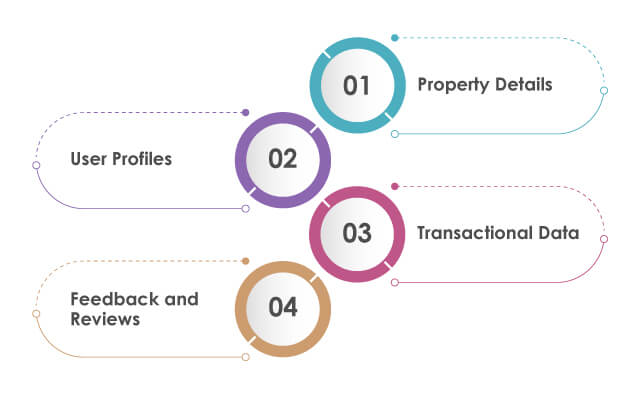
Property Details
It covers everything from property images, floor plans, and descriptions to the number of bedrooms, bathrooms, and the price.
User Profiles
Users often create profiles on these apps. This data can include their names, contact details, search preferences, saved properties, and sometimes their rental or purchase histories.
Transactional Data
When a user decides to rent or buy a property, they might make payments through the app. It involves financial data like bank details, credit card numbers, and transaction histories.
Feedback and Reviews
Many apps allow users to leave feedback on properties, rate, and review real estate agents. This feedback is invaluable for both the app and its users.
All data is not created equal, especially in terms of sensitivity.
Public Data
This includes information that’s openly available to all users. For example, property listings, images, and agent details.
Sensitive Personal Data
When users sign up, they give away personal information like email addresses, phone numbers, and sometimes addresses. While this information is vital for the app’s operation, it’s sensitive and needs protection.
Highly Sensitive Data
This is data that, if misused, can cause significant harm to users. It includes financial details like credit card information or personal identification numbers. Protecting this data is the top priority for any real estate app.
Ensuring Data Accuracy with QA Testing
Providing accurate data is necessary when dealing with real estate apps. QA testing plays a crucial role in ensuring this accuracy. Let’s break down the different types of data accuracy targeted during QA testing.
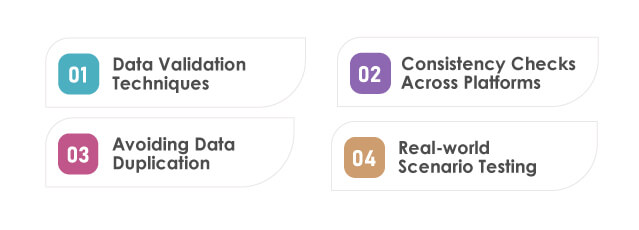
Data Validation Techniques
Validation ensures the data is correct and useful. For example, when users enter their phone number or email address during sign-up, the app must check if it’s in a valid format.
Format Checks
This ensures data is in the expected format. An email, for instance, should have an “@” symbol and a domain.
Range Checks
Testers ensure values fall within an expected range for numeric data, such as property prices, to avoid listing errors.
List Checks
Some fields might only accept data from a specific list, like choosing property types: ‘Detached’, ‘Semi-Detached’, ‘Flat’, and so on.
Consistency Checks Across Platforms
Real estate apps often run on multiple platforms – web, Android, iOS, and sometimes even on smart devices. Data must remain consistent across all these platforms.
Cross-Platform Verification
Testers compare data on different platforms to ensure consistency. A property listed on the web version should match its details on the mobile app.
Version Control
Testers ensure older versions display accurate and consistent data as apps update.
Avoiding Data Duplication
Duplication can confuse users and clutter the app. Imagine seeing the same property listed multiple times with slight variations.
Redundancy Checks
Testers look for duplicate listings and ensure each property is unique in the database.
Merging and Cleaning
If duplicates are found, testers work with developers to merge or clean up the data, ensuring users see clear, singular listings.
Real-world Scenario Testing
Sometimes, testing the app in real-world scenarios is the best way to ensure accuracy.
User Journey Simulations
Testers act like real users, search for properties, interact with listings, and even go through transaction processes to ensure data remains accurate throughout the user journey.
Feedback Loops
Real users can provide feedback if they spot inconsistencies or errors. Testers use this feedback to improve data accuracy continuously.
Securing Real Estate App Data
In the real estate business, the safety of user data is as crucial as its accuracy. Security is essential for real estate apps where transactions involve substantial sums and sensitive information. Let’s explore the various aspects of ensuring data security in these apps:
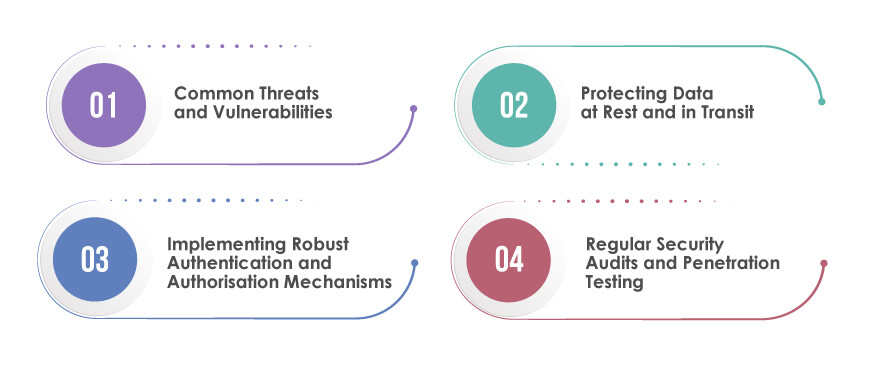
Common Threats and Vulnerabilities
Before securing an app, it’s essential to understand the potential threats.
Phishing Attacks
Cybercriminals might create fake versions of a real estate app to trick users into giving away personal details.
Data Breaches
The app’s security weaknesses can allow unauthorised access, leading to sensitive data leaks.
Malware and Ransomware
Malicious software can be used to steal, corrupt, or lockout data, sometimes demanding a ransom to release it.
Protecting Data at Rest and in Transit
Encryption turns readable data into coded information, ensuring it remains safe when stored and during transmission.
Data at Rest
When user information is stored in databases, it’s encrypted to prevent unauthorised access, even if the database is breached.
Data in Transit
As data moves between the user’s device and the app servers, encryption ensures it can’t be intercepted and read.
Implementing Robust Authentication and Authorisation Mechanisms
Keeping unauthorised individuals out is crucial to data safety.
Multi-Factor Authentication (MFA)
Users may be asked for two or more verification methods before accessing their account, like a password followed by an OTP (One-Time Password).
Role-Based Access
Only authorised personnel access sensitive data in the app’s backend. For example, a customer support representative might not have the same access levels as a senior developer.
Regular Security Audits and Penetration Testing
Routine checks keep the app’s security up to date.
Security Audits
Experts review the app’s security measures, ensuring they meet industry standards and address identified vulnerabilities.
Penetration Testing
This involves simulating cyberattacks on the app to see how well its firewalls hold up. If weaknesses are found, they are adequately addressed.
QA Best Practices for Real Estate Apps
Ensuring accuracy and security for real estate apps demands strict measures and best practices. Let’s walk through some of the leading QA strategies that uphold such applications’ high standards
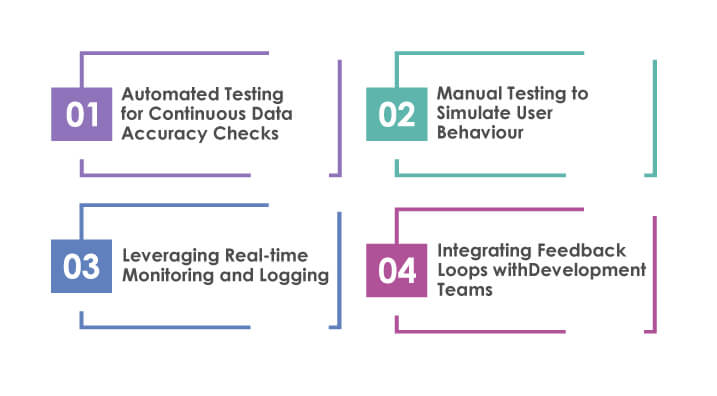
Automated Testing for Continuous Data Accuracy Checks
Automated tests are scripts that run without human intervention, verifying specific parts of the app.
Continuous Testing
By integrating automated tests into the app’s development process, any changes made to the software are immediately tested for errors, ensuring data remains accurate.
Regression Testing
After updates, automated tests check that previously working features are still functional and error-free.
Manual Testing to Simulate User Behaviour
Sometimes, the human touch provides insights that automated scripts can’t capture.
Exploratory Testing
Testers interact with the app without a set plan, mimicking real users’ behaviour to identify unforeseen issues.
Usability Testing
This helps measure the app’s user-friendliness. If users struggle to find property listings or submit data, testers highlight these pain points for improvement.
Leveraging Real-time Monitoring and Logging
Continuous monitoring helps detect and resolve issues swiftly.
Monitoring Tools
Tools like New Relic or Datadog can track the app’s performance, identifying slowdowns or crashes as they happen.
Logging
By keeping detailed logs, teams can backtrack and find the root cause of issues. It’s crucial for both troubleshooting and understanding any security incidents.
Integrating Feedback Loops with Development Teams
Effective communication between QA and development teams streamlines improvements.
Regular Feedback Sessions
By frequently sharing findings, testers and developers can find solutions to identified problems collaboratively.
Iterative Development
As feedback is implemented, QA teams test the improvements, ensuring they’re effective and not introducing new issues.
Overcoming Common Challenges
Developing and maintaining real estate apps presents several unique challenges. However, teams can overcome these challenges effectively with thoughtful strategies and proactive measures.
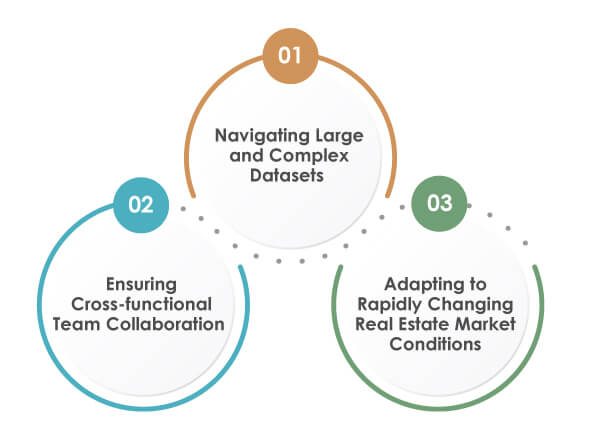
Navigating Large and Complex Datasets
Real estate apps handle vast amounts of data – from property details to user interactions. Managing this data is crucial.
Effective Data Management Systems
Using robust databases and management tools helps organise data efficiently, ensuring quick retrieval and accurate processing.
Data Cleanup Initiatives
Regularly reviewing and cleaning the data ensures it remains relevant and free of redundancies, improving app performance and user experience.
Ensuring Cross-functional Team Collaboration
Developers, QA testers, marketers, and data analysts play vital roles in a real estate app’s success.
Regular Team Sync-ups
Holding frequent meetings ensures everyone is on the same page and challenges are addressed collectively.
Collaboration Tools
Tools like Slack, JIRA, etc., can help teams communicate and keep track of tasks, fostering seamless collaboration.
Adapting to Rapidly Changing Real Estate Market Conditions
The real estate market can be unpredictable. An app must remain flexible to adapt to these changes.
Agile Development
Adopting an agile approach means teams can pivot quickly, implementing changes in response to market shifts.
User Feedback Channels
By keeping open channels for users to share feedback, teams can get firsthand insights into market needs and adjust the app accordingly.
Conclusion
Real estate applications require a balance of accuracy, security, and adaptability. Ensuring data accuracy is not just about preventing minor errors but also about building trust with users. Simultaneously, the emphasis on security highlights the need to safeguard users’ sensitive information against evolving cyber threats.
QA practices provide a structured approach to managing large datasets, ensure collaboration across diverse teams, and swiftly adapt to the ever-changing real estate market conditions. By implementing robust QA testing techniques and being proactive in overcoming challenges, real estate apps can offer a user-friendly and trustworthy experience.
How Can TestingXperts Help with Real Estate App Testing?
At TestingXperts, we understand that real estate applications are more than just digital platforms. They’re tools that drive decisions, manage investments, and promote trust. Our specialised approach to real estate app testing ensures that your applications are not only functional but also robust, secure, and user-friendly. By partnering with TestingXperts, you get
• A dedicated team specialising in real estate app testing and well-versed in its unique requirements
• From ensuring data accuracy to conducting rigorous security audits, we offer a holistic testing approach, covering every aspect of your app for top-performance
• The use of the latest testing tools and methodologies to ensure that our clients are always a step ahead in the technological curve
• Our teams maintain open communication channels, keeping you informed at every stage and ensuring alignment with your business goals
• Recognising that the real estate market is dynamic, our testing frameworks are built for flexibility
• We pay attention to detail, ensuring that every aspect of your app is examined, validated, and optimised
Contact our QA experts now to know more about our real estate app testing services
Discover more
